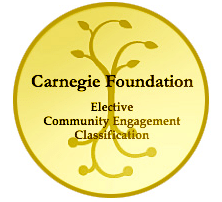The Citadel earns Carnegie Foundation’s Community Engagement Classification
January 7, 2015CHARLESTON, SC – The Carnegie Foundation for the Advancement of Teaching recognized the breadth and quality of service The Citadel provides to the Charleston community, the state and the nation by selecting the college for the 2015 Community Engagement Classification. On Jan. 7, the foundation released a list of 83 colleges and universities receiving the classification for the first time. Only about two percent or 361 of the nation’s more than 7,000 institutions of higher learning now hold the classification.
“At The Citadel, we live by the conviction that a cadet cannot become a leader until he or she first learns to serve,” said Citadel President Lt. Gen. John W. Rosa. “I’m humbled that the Carnegie Foundation recognized the civic leadership demonstrated by The South Carolina Corps of Cadets and The Citadel.”
The Citadel has earned other accolades related to its civic engagement programs, but the Carnegie classification is one of the most known and respected.
“The Citadel does deserve to be recognized nationally, even internationally for this award because the college gives so much our community,” said Quenetta White, principal for James Simmons Elementary School in Charleston. “The cadets make such a positive impression on the children at our school leaving a lasting feeling of respect, hope and joy in the classrooms.”
The classification is not an award. It is an evidence-based affirmation of optimal institutional practices.
“What we really want is for people to have better lives because of this small college trying to make a big impact,”Conway Saylor, Ph.D., director of service learning and civil engagement at the college’s Krause Center for Leadership and Ethics. The center manages many of The Citadel’s community outreach initiatives.
“The Carnegie classification is not just the college’s accolade, but it belongs to all of our community partners. We work together to share knowledge and resources for the betterment of all,” said Saylor. Saylor and her team invested months collecting and compiling data for the more than 30-page application document required by theCarnegie Foundation.
“It takes mutual trust and understanding with community partners to be successful with a civic engagement program on the scale of The Citadel’s,” Saylor said. “We are grateful for the privilege of being able to work with and serve so many remarkable people.”
Some of The Citadel’s ongoing community engagement programs include an annual Leadership Day during which the majority of the college’s cadets fan out across the Charleston Lowcountry for a day of service; weekly commitments to work with students in Title I schools, veterans, people who have disabilities, and others in need; and the Citadel initiated and operated School Heroism Activity for Remembrance and Enrichment or SHARE program, which conducts heroism-themed outreach in Charleston’s Innovation Zone and Promise Neighborhood Schools. Additionally there are required service learning courses. The service hours provided through the Sophomore Service Learning Lab equaled an estimated $110,858 in value to the community in 2012-13 alone.
The Carnegie Foundation defines community engagement as “the partnership of college and university knowledge and resources with those of the public and private sectors to enrich scholarship, research, and creative activity; enhance curriculum, teaching and learning; prepare educated, engaged citizens; strengthen democratic values and civic responsibility; address critical societal issues; and contribute to the public good.”
Once an institution earns the Carnegie Foundation’s Community Engagement Classification, it retains it as it continues to expand and enhance campus-wide community engagement. The next opportunity for institutions to apply will be during the foundation’s 2020 cycle.
[youtube url=”http://youtu.be/qGGmQdlZvno”]
About The Citadel
Charleston, South Carolina. The Citadel offers a classic military college education for young men and women profoundly focused on leadership excellence and academic distinction. Graduates are not required to serve in the military but about 35 percent of each class commission as officers in every branch of U.S. military service. Graduates of The Citadel have served the nation, their state and their community as principled leaders since the college was founded in 1842. The Citadel Graduate College offers more than 40 Master’s degrees and graduate certificates in a wide range of disciplines, plus five undergraduate programs, through an all-evening schedule. Some graduate courses are available online.





















